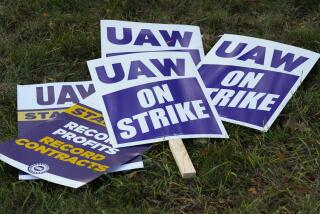Effects of Hormel Strike Linger in Minnesota Town
- Share via
AUSTIN, Minn. — The Jaycees’ sign on the outskirts of town proclaims “the good life is here to stay,” but hundreds of meatpackers face a second straight Christmas without work and the bitter aftermath of the long strike at Geo. A. Hormel & Co.
“It’s hurt, definitely,” said Robert Foss, 71, who has spent nearly half of his life in this southern Minnesota town of 22,000. “It’s split families, it’s split friends. I don’t think I’ll live long enough to see this settled.”
In September, union members at Hormel’s flagship plant ratified a contract ending a strike that began Aug. 17, 1985. But they got no guarantee of recalls for those who refused to cross the picket line.
“(With) 20-20 hindsight, I would have crossed it in a minute,” said Richard Auer, an 18-year Hormel employee who refused to return to work when the plant reopened in January. He has not been recalled.
About 1,400 members of Local P-9 of the United Food and Commercial Workers walked out over wages and working conditions. Hormel, saying it needed to stay competitive, cut the base wage by 23% to $8.25 an hour in October, 1984.
When the plant reopened in January, about 550 employees crossed the line and the company hired 550 replacement workers. Today, the plant employs 1,015--461 returnees and 554 newly hired employees. An additional 666 workers remain on the recall list, Hormel Senior Vice President Chuck Nyberg said.
Hormel officials say they have no immediate plans to expand the work force at the 4-year-old Austin plant, which could employ as many as 2,200, although the most that have worked at the $100-million plant was 1,700 more than three years ago.
“I feel badly because we still have some people out there we know are good people,” said Richard L. Knowlton, Hormel’s chairman and chief executive. “We do not have the work for them.”
When Local P-9 refused to end the strike, the parent union forced the local into trusteeship, suspended its officers and negotiated a contract that boosted the plant’s base wage to $10.70 from $10 an hour over three years. Suspended P-9 President Jim Guyette has appealed a federal judge’s decision upholding the trusteeship and says he will take the case to the U.S. Supreme Court, if necessary.
The scars run deep, and vandalism against striker and non-striker alike is on the rise in the town where Hormel was founded in 1891. At the peak of the strike, the National Guard was called out to maintain security, scores were arrested and frequent shoving matches erupted on the picket line.
Ray Rogers, a labor consultant hired by P-9, said the strikers’ call for a national boycott of Hormel products--SPAM luncheon meat, Little Sizzlers sausages and Cure 81 ham--continues. But the company, which posted record net sales of $1.9 billion and earnings of $39 million in fiscal 1986, said the boycott has had no effect.
More to Read
Inside the business of entertainment
The Wide Shot brings you news, analysis and insights on everything from streaming wars to production — and what it all means for the future.
You may occasionally receive promotional content from the Los Angeles Times.










